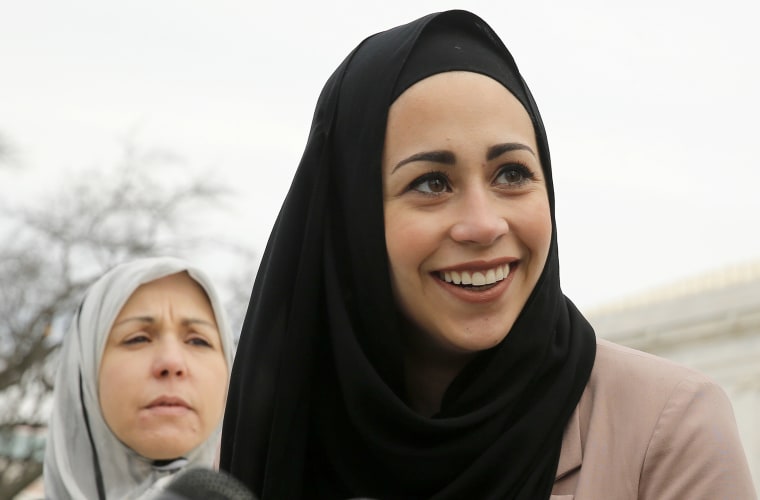Seven-years ago, Samantha Elauf was just a teenager in Oklahoma who wanted to work at an Abercrombie Kids store. When she didn’t get hired, Elauf started a legal journey that finally ended Monday.
The U.S. Supreme Court ruled that Abercrombie and Fitch discriminated against her when it denied her a job because of her hijab, her religious head covering.
Elauf, who is Muslim and now in her mid-twenties, still living in Oklahoma, issued this statement to NBC News through the Council of American Islamic Relations (CAIR): "I was a teenager who loved fashion and was eager to work for Abercrombie & Fitch. Observance of my faith should not have prevented me from getting a job. I am glad that I stood up for my rights, and happy that the EEOC was there for me and took my complaint to the courts. I am grateful to the Supreme Court for today's decision and hope that other people realize that this type of discrimination is wrong and the EEOC is there to help."

The case was brought before the high court by the U.S. Equal Employment Opportunity Commission (EEOC), after Elauf first contacted the Oklahoma office of CAIR.
Elauf’s case hinged on whether an employer can be liable under Title VII of the Civil Rights Act of 1964 for refusing to hire an applicant or discharging an employee based on a "religious observance and practice" only if the employer has actual knowledge that a religious accommodation was required and the employer's actual knowledge resulted from direct, explicit notice from the applicant or employee.
Justice Antonin Scalia ruled that Elauf needed only to show that her need for an accommodation was a motivating factor in the employer's decision.
"A request for accommodation ... may make it easier to infer motive, but it is not a necessary condition of liability," Scalia wrote. “Title VII does not demand mere neutrality with regard to religious practices — that they be treated no worse than other practices. Rather, it gives them favored treatment . . .Title VII requires otherwise-neutral policies to give way to the need for an accommodation."
Justice Clarence Thomas was the sole dissenter. He said that "mere application of a neutral policy" should not be viewed as discrimination.
But Adam Soltani saw how a “neutral policy” can be discriminatory.
“(Abercrombie) said her wearing the headscarf violated the look policy,” said Soltani, the executive director of CAIR/Oklahoma, in an interview with NBC News. “They felt she did not fit into their look policy and that’s why they chose not to hire her.”
William Burgess, CAIR’S senior staff attorney said the ruling now lifts the burden off the employee and puts it on the employer where it belongs.
“If they don’t want to hire someone because they don’t want to deal with a change in their policy, they will be liable for that,” Burgess told NBC News.
Friend-of-court-briefs supported Elauf and claimed employment discrimination against head scar wearers to be significant.
The EEOC reported the Muslims file more employment and discrimination claims than any other religious group.